Latest Posts
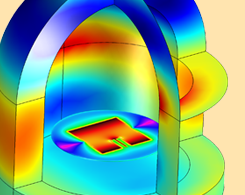
Assessing a Radome Design’s Ability to Improve Antenna Directivity
Bad weather and harsh environmental conditions can negatively effect antenna directivity, and in turn, wireless communication. Using simulation, you can design radomes that improve this quality.
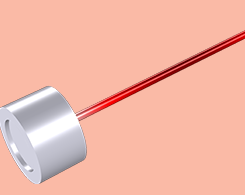
Analyzing Hearing Aid Receivers with Lumped-Parameter Modeling
Modeling complete hearing aid systems is extremely computationally expensive. Enter lumped-parameter modeling, which enables you to couple a system component to a test setup for validation.

Building COMSOL Multiphysics Models with Excel® and Visual Basic®
Say you want to base your model on data kept in the Excel® spreadsheet software. Using LiveLink™ for Excel®, you can interface between the spreadsheet and the COMSOL Multiphysics® software.
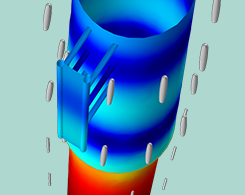
Model Electrodes with Nonideal Connectivity in Corrosion Analyses
Learn the appropriate boundary conditions for performing a corrosion analysis in which an electrode is connected to an external short circuit.

Designing CSRR-Based Sensors to Monitor Chronic Kidney Disease
Chronic kidney disease can be effectively diagnosed, prevented, and treated through the use of noninvasive CSRR-based sensors. Researchers optimized the design of these sensors with simulation.
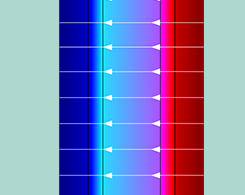
Analyzing Reverse Electrodialysis Units with Multiphysics Modeling
Pass the salt…for a clean energy solution. Salinity gradient power relies on osmosis between fresh- and saltwater to generate power, and simulation can help analyze and optimize such systems.
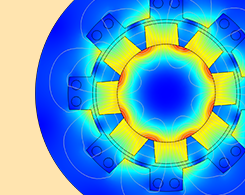
Simulating the Electrothermal Transients in Superconducting Magnets
In order to design superconducting magnets for a particle accelerator, such as the Large Hadron Collider at CERN, researchers need to simulate and optimize their electrothermal transients.
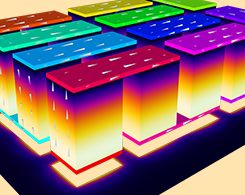
How to Analyze Thermoelectric Cooler Designs with a COMSOL App
A simulation application, such as one for a thermoelectric cooler design, can be used to test a variety of parameters in order to optimize a device for a specific use.
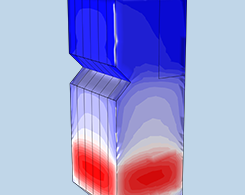
Analyzing Utility Boiler Designs by Simulating Radiative Heat Transfer
To study a utility boiler furnace, you need to account for the effects of radiation, which is difficult to solve for analytically and study experimentally. That’s where simulation comes in.
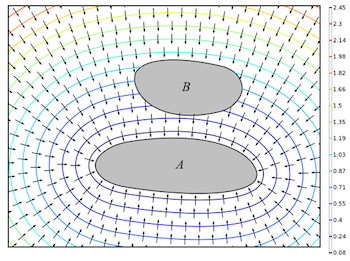
How to Compute Distances Between Objects in COMSOL Multiphysics®
Compute the distance between two deforming objects in the COMSOL Multiphysics® software. Here’s how…
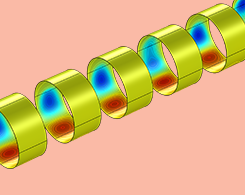
Comparing Hydrodynamic Bearings with Rotordynamics Analyses
Compare the load capacities for different types of hydrodynamic bearings and determine which is best suited for your area of study by using the Rotordynamics Module.

How to Analyze Beam Sections Using the Beam Section Calculator
Simulation applications can be used as utility tools to compute the properties and parameters of a component or device. In this example, the application analyzes beam section geometries.
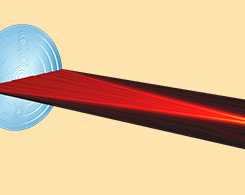
How to Implement the Fourier Transformation from Computed Solutions
In this wave optics demonstration, learn how to implement the Fourier transformation for computed solutions, using the example of an electromagnetic simulation of a Fresnel lens.

Analyzing Novel Roof Tile Designs with Multiphysics Simulation
To investigate a novel design for roof tiles that can keep buildings cool in hot climates, called Life HEROTILE Project, a research group from Italy turned to multiphysics simulation.
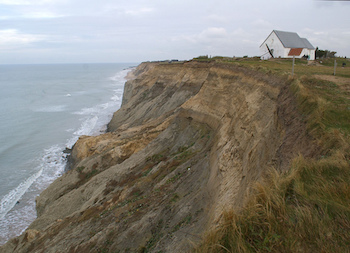
Solving Shallow Water Equations with Equation-Based Modeling
Shallow water equations are an example of equation-based modeling. You can define expressions in COMSOL Multiphysics® to solve a shallow water equation for coastal erosion analyses.
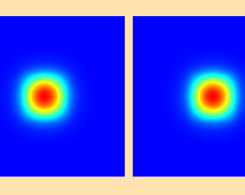
Improving the Design of Monolithically Integrated Magneto-Optic Routers
Magneto-optic (MO) routers are an efficient alternative to electro-optic (EO) routers for communication systems. Learn about a modeling approach used by researchers to improve MO router designs.

Happy Birthday, Galileo Galilei
Galileo Galilei was a renowned astronomer who changed the way we think about mathematics, physics, and astronomy.
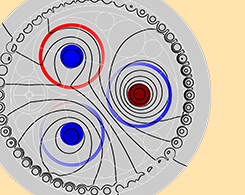
How to Model the Electromagnetic Heating of Underground Cables
Underground power cables are beneficial in many ways, but they are also subject to overheating. To design better cables, we can model their electromagnetic heating in COMSOL Multiphysics.
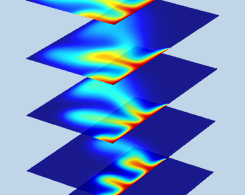
Which Porous Media and Subsurface Flow Interface Should I Use?
We go over a comprehensive selection of porous media and subsurface flow interfaces available to you in the COMSOL® software so that you can find the right choice for your modeling objective.
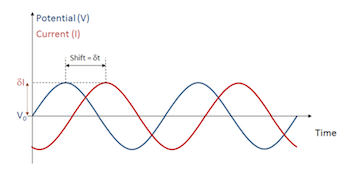
Electrochemical Impedance Spectroscopy: Experiment, Model, and App
Experience the phenomenon of electrochemical impedance spectroscopy (EIS) in 3 ways: experiment, model, and simulation application.

Efficiently Verify Electric Fields Outside Electrical Installations with Apps
Electrical installations are required to have their surrounding electric fields fall within certain levels. A simulation application can be used to verify measurements and adhere to standards.
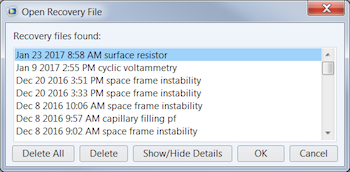
How and When to Open Recovery Files in COMSOL Multiphysics®
If, by chance, the software shuts down before your simulation converges, just use the Open Recovery File feature to pick up where you left off and find your model’s solution.
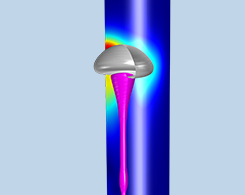
Preventing Bubble Entrapment in Microfluidic Devices Using Simulation
Microfluidic devices are no match for bubbles. In fact, if bubbles become trapped in a microfluidic device, it could malfunction. Veryst Engineering created a CFD model to study this process.
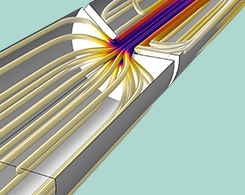
Fat-Washing Cocktails on an Industrial Scale
Bacon-flavored vodka? Pecan-infused bourbon? The fat-washing process extracts the flavors from fat and dissolves it into alcohol, and it can even be scaled up to an industrial level.
